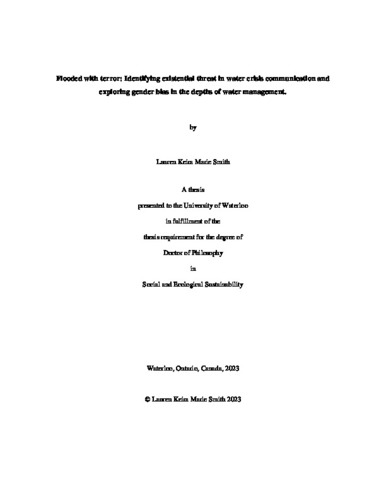| dc.contributor.author | Smith, Lauren | |
| dc.date.accessioned | 2023-08-30 17:21:49 (GMT) | |
| dc.date.available | 2023-08-30 17:21:49 (GMT) | |
| dc.date.issued | 2023-08-30 | |
| dc.date.submitted | 2023-08-22 | |
| dc.identifier.uri | http://hdl.handle.net/10012/19804 | |
| dc.description.abstract | The purpose of this dissertation was to advance understanding of gender inequity in water management and the ways in which threatening water communication may contribute to that inequity. Water crises are increasing with climate change and the communication of potentially fatal outcomes are ever-present via media and ongoing catastrophic climate events. While climate scholars have demonstrated that diverse decision-making groups lead to improved environmental and ethical outcomes – outcomes that include effective solutions to water crises – top-level water management in the Global North remains largely homogenously male. I explored this disconnect through the lens of Terror Management Theory (TMT) to identify how life-threatening water crisis communication may influence environmental attitudes and intergroup relations within water decision-making contexts. Terror Management Theory empirically tests the influence of mortality reminders on human behaviour and has identified predictable and replicable ways in which we respond to reminders of our eventual demise (Chapter One). Climate change has been established as a mortality reminder within Terror Management Theory research, as it evokes existential anxieties in those who consider experiencing climate change or its consequences. Water, however, had not previously been tested as a mortality reminder.
The research within this dissertation was guided by three interconnected objectives: (1) to determine if threatening water messages evoke mortality salience similarly to typical TMT mortality reminders; (2) to identify how pro-environmental worldviews or identities are influenced by mortality salience and/or life-threatening water reminders; and (3) building on prior objectives, to determine whether judgments about same or different gendered water decision-makers are influenced by mortality salience from a typical and/or water-related mortality reminder.
This dissertation followed social psychology methods as developed and applied within Terror Management Theory to identify the psychosocial responses to threatening water reminders (Chapters Two and Three) and the influence of these responses on gender dynamics within water crisis decision-making (Chapter Four). Findings provided confirmation that some framings of water crises evoked mortality anxieties in American and Canadian populations (Chapter Two) and delivered evidence of environmental identity reinforcement following a typical mortality or life-threatening water reminder (Chapter Three). Findings also illustrated that mortality salience influenced appraisal of male and female water managers, and that these appraisals were also influenced by underlying levels of sexism and, potentially, connected gender role stereotypes.
In addition to academic contributions from this research, outcomes from this dissertation inform water communication campaigns (e.g., when threatening communications might be motivating for pro-environmental change and when might it not) and for guidance regarding equity efforts, particularly among leadership contexts that are presently male-dominated. Understanding how to develop and implement water crisis solutions is necessary in our changing climate. These solutions require recognizing how to best create and foster diverse, equitable decision-making groups that retain and respect that diversity so all can be meaningfully included. | en |
| dc.language.iso | en | en |
| dc.publisher | University of Waterloo | en |
| dc.subject | water management | en |
| dc.subject | gender studies | en |
| dc.subject | terror management theory | en |
| dc.subject | mortality salience | en |
| dc.subject | climate change | en |
| dc.subject | interdisciplinary | en |
| dc.subject | environmental identity | en |
| dc.subject | gender equity | en |
| dc.title | Flooded with terror: Identifying existential threat in water crisis communication and exploring gender bias in the depths of water management | en |
| dc.type | Doctoral Thesis | en |
| dc.pending | false | |
| uws-etd.degree.department | School of Environment, Resources and Sustainability | en |
| uws-etd.degree.discipline | Social and Ecological Sustainability | en |
| uws-etd.degree.grantor | University of Waterloo | en |
| uws-etd.degree | Doctor of Philosophy | en |
| uws-etd.embargo.terms | 0 | en |
| uws.contributor.advisor | Wolfe, Sarah | |
| uws.contributor.affiliation1 | Faculty of Environment | en |
| uws.published.city | Waterloo | en |
| uws.published.country | Canada | en |
| uws.published.province | Ontario | en |
| uws.typeOfResource | Text | en |
| uws.peerReviewStatus | Unreviewed | en |
| uws.scholarLevel | Graduate | en |

